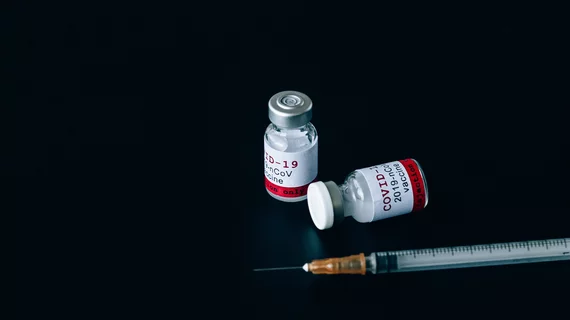Radiology department shares tips to mitigate COVID-19 vaccination mandates' impact on operations
Henry Ford Health System’s Department of Diagnostic Radiology has logged a 6% noncompliance rate following an organization-wide COVID-19 vaccination mandate, with leaders offering a few key lessons learned on Friday.
The Detroit-based hospital group was one of the first to announce it would require healthcare workers to receive the shot, setting Sept. 10 as the initial deadline. About 90 employees working in imaging failed to meet that mark, quelling concerns mandates would dramatically worsen workforce shortages, researchers detailed in the Journal of the American College of Radiology.
MRI technologists and radiology tech assistants recorded the highest initial noncompliance rates at 37% and 38%, respectively, and only one hospital had to cut hours of operation in imaging due to the directive.
“Despite initial concerns about the impact of vaccine-mandate noncompliance on departmental operations, there was ultimately little effect due to improved vaccine compliance following the mandate,” neuroradiologist and corresponding author Brent Griffith, MD, and colleagues wrote Nov. 19. “Understanding individual employee and locoregional differences in vaccine compliance can help leaders proactively develop mitigation strategies to manage this new challenge during the COVID-19 pandemic.”
Griffith et al. completed their study using vaccine compliance data across all of Henry Ford’s more than 30,000 team members. All told, 1,506 radiology department workers were included in the study, with vaccination noncompliance rates ranging from 0.5% to 7% at the organization’s five hospital sites. Noncompliance numbers in the radiology department (6%) mirrored those of the overall organization (8%).
Rad tech assistants and radiology supervisors had the highest rates of refusal at the September deadline at 13% and 8%, respectively. On the other side, diagnostic radiologists and radiology nurses were the lowest, with 100% of such employees vaccinated. About 8% (or 122 members of the radiology team) received medical or religious exemptions. As of Oct. 5, about 99% of all Henry Ford employees were fully vaccinated, had received their first dose, or were granted an exemption. Roughly 400 employees decided to leave their jobs rather than receiving the shot, including 14 radiology employees (less than 1%).
Griffith and colleagues discovered the highest noncompliance rates at two hospitals located in counties that voted majority Republican in the 2020 presidential election while the lowest occurred in majority-Democrat counties. Only one in the former category—Henry Ford Allegiance Hospital in Jackson, Michigan—had to modify imaging operations due to staffing shortages that were secondary to vaccine mandates. This location canceled outpatient MRI exams for one Saturday in October and logged a 5.5% decline in volume relative to weekly averages.
The authors credited Henry Ford’s high uptake to strategies including hosting several town halls, answering any frequently asked questions, and launching job fairs in anticipation of possible shortages. Radiology administrators also met with two-thirds of noncompliant employees ahead of the deadline to better understand their concerns. Common questions covered topics such as side effects, fertility, shift coverage if experiencing illness, and the legality of mandates.
“Ultimately, it is critical for health systems to be proactive and anticipate staffing shortages to minimize any potential interruptions in patient care due to a vaccine mandate,” the authors advised.

